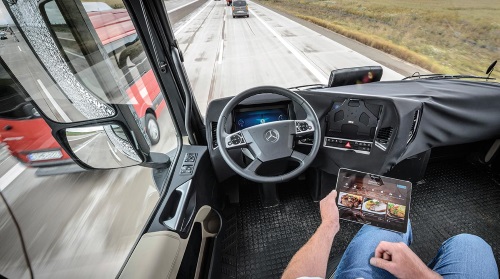A new report compiled by the World Road Transportation Organization or IRU finds that transport companies in Europe, Asia and the Middle East region are “extremely optimistic” about the deployment timeline for vehicle automation, with 76 percent of those polled by the IRU expecting autonomous trucks to become a “viable option” within the next decade.
[Above photo by Daimler AG.]
Of the transport companies that view self-driving trucks as a near-term “viable options,” the IRU said 29 percent believe they will be a “reality on our roads” within the next five years. On top of that, 50 percent of the transport companies surveyed by the group think that the “primary benefit” of automation will be boosting productivity, with 19 percent expecting automation to help cut costs.

“There is no question that autonomous trucks will eventually be transformative for the industry – helping boost productivity, create efficiencies and enhance driver working conditions,” noted Boris Blanche, IRU’s managing director, in a statement. “But drivers will not become obsolete any time in the future, and in fact the industry must continue to encourage more drivers into the profession. Proper and responsible adoption over time is required, and we must see full cooperation from all industry stakeholders.”

“For technology to take hold, and for the industry to truly benefit from it, we must ensure we have the foundations in place. This means first getting the basics right, such as full transitioning to digital documentation, improving traceability, security and efficiency,” added Umberto de Pretto, the IRU’s secretary general. “We must work harder to join the dots between operators, service providers, manufacturers and governments to nurture a supportive environment for innovation and digitization.”
The group noted that its survey – overseen by Random SA and Asia Research Partners – received responses from 450 employees who work for a transport operator, transport broker, or freight forwarding company in one of 19 countries in Europe, the Middle East region, and Asia.
The survey also found that transport companies believe “developments in technology and innovation” will be key to building a “safe, successful, and sustainable industry” in the future, with one in three or 33 percent of those polled across every region believing that improving safety will be the biggest innovation opportunity, while one in five cite automation.
Yet barriers to adopting technology persist, the IRU said, as 71 percent of the transport firms it polled said the main challenges to adopting “technology driven innovation” is the cost and investment required, with 50 percent citing a “limited understanding” of the range of emerging technologies available.
 Top Stories
Top Stories
USDOT Issues $1B in Local Road Safety Funding
January 2, 2026 Top Stories
Top Stories

